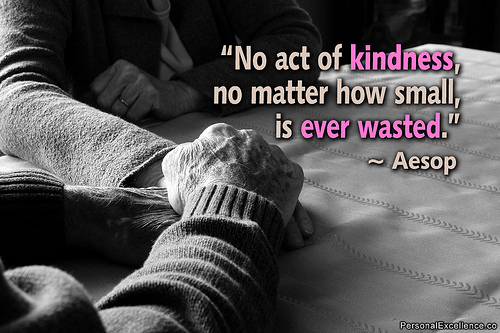The happiness he gives, is quite as great as if it cost a fortune. – Charles Dickens (speaking as Ebenezer Scrooge)

The little things matter. Just holding someone’s hand or saying hello can mean as much as a great fortune to them, and it costs you so very little. Be kind. Be generous.
What does that mean?
On this day in 1842, Charles Dickens published his famous book “A Christmas Carol.” This quote is by Ebenezer Scrooge, reflecting on his younger self.
He is speaking about his boss when he was an apprentice, and the longer quote explains how the small tokens the boss gave them could impact the lives and attitudes of the workers:
“He has the power to render us happy or unhappy; to make our service light or burdensome; a pleasure or a toil. Say that his power lies in words and looks; in things so slight and insignificant that it is impossible to add and count ’em up: what then? The happiness he gives, is quite as great as if it cost a fortune.”
The quote is about the little things in a relationship, specifically a work relationship, but I believe it applies to plenty of other relationships.
Why are the little things so important?
Think of the little things in your interpersonal relationships, and how much they mean to you. Either as the recipient or the person taking the action, think about how much saying “Hi,” waving, or even simply saying someone’s name means to that person.
This quote is about those little things, for it is the little things which can make a day pleasant or very much less so. A smile, or a scowl? From the boss, that can change how an employee feels for the rest of the day. How much more does the smile cost than the frown? Are the frowns on sale?
All silliness aside, these little things are the social lubricant which helps each of us better deal with all of the stress and silliness which is modern life. Kind words, kind gestures (as opposed to the other kind of gestures), and simple acts of kindness make life nicer for everyone.
Ebenezer later went on to demonstrate the dark side of the quote, making life for those in his employ unhappy, burdensome, and a toil. At least until his transformation, when he went back the other way, and remembered both the big things, as well as the little things. In the book it is quite a contrast.
Where can I apply this in my life?
Often in this blog, we take a big issue and figure out how to apply it to our personal life and scale it to our influence. In this case, the quote is tailor made to the efforts of an individual. So with that in mind, we shall consider how we interact with others, and how we can make the little things count.
We all have things we like, and things which annoy. So does everyone else. But the trick is not everyone agrees on which is which, and how we should express ourselves. Sometimes it is personal preference, other times it is a cultural thing. We need to recognize these differences, and to make adjustments.
Let’s start with the things you like. What are the little things which help you feel better, and make it easier to decide to be happy? Little compliments (on work, effort, clothes, …)? Token gestures (opening doors, holding elevators, …)? What else?
Now think for a moment about some of the people you deal with most often. What of the things you have done have they reacted to in a positive manner? What were they not so fond of? Can you remember these things next time you see them, or do you want to write some of them down?
The quote is specifically about a work environment, take a moment and consider the people you work with. Even if it is in a position as a volunteer or as a full time kid-wrangler, who do you deal with in a position of authority, or as a subordinate?
How do they treat you, and does it tend to make your service light, or burdensome? Pleasure or toil? Have you ever spoken to them to let them know what you like or don’t like? How receptive have they been? Have you been too subtle, or are they trying to be mean? Those kind of people do exist.
Now consider the opposite, the times when others have approached you. Have you paid attention? Have you taken their concerns and preferences to heart? Have you been able to remember them? Should you write them down, and take a moment at the start of each day to refresh yourself?
It is up to us to decide how we will behave around others. We can be a source of happiness, or of misery. While some of that is up to the other person to determine, much of it is within our ability to make happen.
How do you want to influence others? Do you want to be a pleasure to be around, or will you make it unpleasant?
From: Twitter, @DickensYouSay
confirmed at : http://en.wikiquote.org/wiki/A_Christmas_Carol#Stave_2 3rd entry
Photo by Celestine Chua
Related articles
- Feed the Fezziwig (librarylostfound.com)
- What Ebenezer Scrooge Can Teach Us About Great Writing (warriorwriters.wordpress.com)
- Ebenezer Screwed (theirrefutableopinion.com)
- Don’t Be a Scrooge!! – Gift Giving Etiquette (lead4style.com)
- Video: In defense of Ebenezer Scrooge (theblaze.com)






